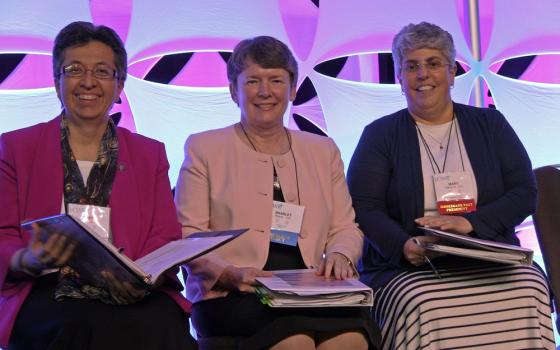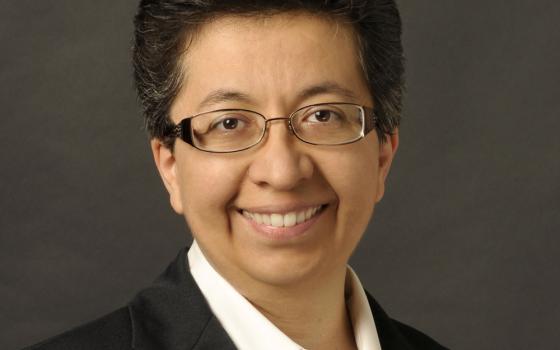Drawing on images of new life after disruption and destruction, Sr. Teresa Maya painted a future of religious life of hope and renewal amid tumultuous times for the church and society in her presidential address at the Leadership Conference of Women Religious assembly.
"We have been called to leadership during extraordinary times," she said. "The much anticipated 'change of epoch' is upon us in full force."
For Maya, a Sister of Charity of the Incarnate Word, lessons for religious life lie in volcanoes. Following the 1980 eruption of Mount St. Helens, a friend told Maya that bright wildflowers gradually bloomed amid the ash, including some locals had never seen before. Women religious may be feeling the eruptions now; indeed, some ash may already be among some communities, she said. But "there is color in the ashes."
The assembly's guiding theme, "Being the Presence of Love: The Power of Communion," resonated in Maya's address, delivered Aug. 8 in St. Louis on the first full day of the annual assembly of LCWR, which represents 80 percent of about 48,500 women religious in the United States.
Maya, who is Mexican-American, prayed in Spanish to her grandmother for a blessing before addressing the 790 participants.
The challenges the president of LCWR posed to the religious leaders in the room were clear: to lead as a community, no matter how great or few in number; to listen to younger sisters and young people; and to confront the prejudices that permeate, however subtly, the institutions they lead.
Foremost, she challenged all religious to go forth, en salida, as Pope Francis has called them to do.
"We need to understand the 'why' of our leadership in light of the times we live," she said, recalling natural disasters, recurring gun violence, the international refugee crisis, ongoing scandals in the Catholic Church, the #MeToo campaign emphasizing the dignity of women, and the weakening of international alliances.
"This has not been a year to stay at home."
Communities face 'final eruption,' and beyond
Religious life is living close to "a final eruption that will wipe out what we have come to know, struggle with and love about this life — everything," Maya said. "How ready are we, really?"
Communities are facing funerals, ministry changes, dealing with property, and arranging for care of their members. "Some days, I wonder: Is this our principal call as leaders of religious institutes at this time?"
Holding a blue-green glass egg made from the ash of Mount St. Helens, she told the audience: "We did everything we were supposed to do by taking the [Second Vatican Council] renewal to heart. ... We have been faithful women. This same faith will allow us to look beyond the ashes to the color that they make possible."
With her congregation facing completion, Sr. Frances O'Brien, whose Canadian community is an associate member of LCWR, said in an interview after the address that the imagery of a final eruption did not distress her, but instead made her think, "It's going out with a bang."
The Sisters of Providence of St. Vincent de Paul of Kingston, Ontario, have been doing the difficult work of preparing for completion for four years, she said. The process "has brought us much closer together in communion. We are facing this reality that is beyond our control except that we can plan to navigate it well together," O'Brien said. "I think that's one of our wildflowers."
The community response to the recent hurricanes and earthquakes in Texas, Puerto Rico and Mexico is a testament that nature is challenging the very concept of individualism, Maya said. Fortunately for women religious, community is "what we do best."
"There is nothing more important, more radical, more necessary for us than to lean into our apostolic call to nurture and foster community wherever we find it, wherever we are, with whatever means we have."
"Hope is the gift of communion," she said, posing questions for assembly participants to reflect upon. "Leadership must vision beyond the preparation for the final eruption. We need to point to the wildflowers already showing up among us."
If women religious stay faithful to what the Spirit is asking, "then we will be ready for what comes," Mercy Sr. Pat Whalen said, reflecting on Maya's references to wildflowers.
Sisters must "listen to one another, to what the voices of society are saying to us," she said. "Out of the darkness and ashes came this beautiful field of colorful flowers, and certainly that's a message of hope and life for our future."
Leaders must listen to next generation
A priority for leaders in religious communities, Maya said, is to shift to a place of listening — particularly to millennials both in religious life and beyond.
"Young people are not the problem," Maya said, citing an editorial from National Catholic Reporter. "The young — like any one of us, really — are simply looking for authenticity."
The U.S. is becoming more secular, she said, challenging sisters to have conversations with young people.
"Our nuns, our sisters, our communities need to go forth into these conversations with the 'nones,' " she said. "I have hope in the conversations being convened by the Nuns and the Nones movement."
That younger generations of religious women today come from a place of vulnerability, smallness and need — a far cry from the self-sufficiency familiar to the past — is a gift, she said. "They need each other in ways older generations never did and will therefore yield something far more organic and generative."
"We are called to join them, not called to get them interested in our issues or fall into the temptation of organizing them."
"We do have a few good years to bless the next generation with our wisdom and our trust, to kindle in them the hope of God's vision for humanity," Maya said in her address. "We must mentor, facilitate and even fund the dream of the next generation of religious."
Sr. Pat Smith of the Sisters of St. Francis of Philadelphia agreed with Maya in an interview after the talk, saying their younger sisters are particularly interested in direct service to people who live in poverty. "They're calling us to it."
'We will be enough'
Women religious in the United States "are now charged with discerning where that core energy needs to be refocused," Maya said. "We are about doing something, whatever it is, that will collaborate in welcoming the reign of God."
The challenge today for "small, frail communities" is figuring out how to lead in their remaining days "so that even in our dying we are giving, doing, moving and promoting," Maya said. "Sisters, our time in leadership will not be complete until we have called all of our sisters to share the why of their extraordinary lives."
Now is not the time to shelter the older sisters, Maya said; they are to be called forth, as well. "They are testifying to lives with meaning" and can give hope to elders who are struggling to do the same.
How women religious execute their apostolic response today, primarily in the wake of the refugee crisis, "should kindle our hope," Maya said. "We could not send dozens of sisters to the border. We sent some. We could not house thousands of refugees and migrants. We housed some. We could not march by the hundreds. We marched some."
Women religious are being forced to abandon certain structures and sizes that have been familiar to their communities for decades, she said.
"However, we will be enough," Maya said to applause. "We are enough. We are what God needs today."
Leadership also faces the challenge of addressing "the prejudice and division that has tainted and diminished our community," she said.
Workshops and assemblies are not enough to work through the consequences of white privilege and unconscious bias, she said.
"The time has come for us to model for the world around us that we can be communities of reconciliation," Maya said, recognizing the recent 50th anniversary of the National Black Sisters' Conference.
Until this reckoning — through "critical, painful and, yes, shameful" conversations on the consequences of institutional racism — "we are not leading communities of faith," Maya said, adding that she is a migrant religious herself.
"Are we sure we are not being poisoned by the toxic environment that surrounds us? Are we sure that we are open to the wave of migrant religious that is already browning our institutes, our ministries and our church?"
Maya frequently spoke in her native Spanish: "La vida religiosa no tiene fronteras — religious life has no borders. We are called to lead into a communion we have never seen before that will renew our hope in our common humanity, a communion with leadership willing to lead into a reconciled diversity."
The challenges before religious life today require leaders to turn off auto-pilot and assume responsibilities that appear beyond reach. "To lead a communion of faith, we need to embrace the vulnerability that has brought us together," she said.
The key for communion is in collaboration: "Our world is desperate for this witness."
In closing, Maya recalled her grandmother's death and the moment her abuela told her, "No le tengas miedo a la muerte, allí estaremos; do not fear death, we will be there for you."
"We lead communities of faith that remain communities beyond death," she said.
The marigold bridge from the Pixar movie "Coco" — the colorful path that leads to the afterlife — appeared on the screen behind Maya.
"I choose an image of vivid color because after the final eruption, the ash and the lava, there will be so much color. But we will only be able to see it with the eyes of faith. We are encouraged by the deep knowledge of the communion that sustains all communions, the realization that those who have passed live among us, journey with us. They encourage us on, to head to the door, to the people of God."
"Trust the color in the ashes."
[Soli Salgado is a staff writer for Global Sisters Report. Her email address is ssalgado@ncronline.org. Follow her on Twitter: @soli_salgado.]





